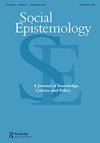Defining Wokeness
IF 2
2区 哲学
Q1 HISTORY & PHILOSOPHY OF SCIENCE
引用次数: 2
Abstract
ABSTRACT Rima Basu and I have offered separate accounts of wokeness as an anti-racist ethical concept. Our accounts endorse controversial doctrines in epistemology: doxastic wronging, doxastic voluntarism, and moral encroachment. Many philosophers deny these three views, favoring instead some ordinary standards for epistemic justification. I call this denial the standard view. In this paper, I offer an account of wokeness that is consistent with the standard view. I argue that wokeness is best understood as ‘group epistemic partiality’. The woke person does extra epistemic work before forming a negative belief about a member of an oppressed social group. Just as we do extra epistemic work when forming belief about our friends, so the woke person does for members of oppressed social groups. I first outline the account. I then raise questions about the scope of wokeness and belief formation. After this, I demonstrate that the group partiality view is consistent with the standard view in epistemology. The partiality view, therefore, should appeal to epistemologists who have adopted the standard view because it is consistent with ordinary standards of justification. I conclude that wokeness as a concept in epistemology should not be controversial for those who endorse the standard view.定义Wokeness
摘要里玛·巴苏和我分别介绍了wokeness作为一种反种族主义的伦理概念。我们的叙述支持认识论中有争议的学说:多嘴多舌的错误、多嘴多嘴多嘴的自愿主义和道德侵犯。许多哲学家否认这三种观点,转而支持一些普通的认识论正当性标准。我称这种否认为标准观点。在这篇论文中,我提供了一个与标准观点一致的wokeness的描述。我认为wokeness最好被理解为“群体认识偏好”。清醒的人在对受压迫的社会群体的成员形成负面信念之前,会做额外的认识工作。正如我们在对朋友形成信念时做额外的认识工作一样,觉醒的人也为受压迫的社会群体成员做同样的工作。我首先概述一下这个账户。然后,我提出了关于wokeness和信念形成的范围的问题。在此基础上,论证了群体偏倚观与认识论中的标准观是一致的。因此,片面性观点应该吸引那些采用标准观点的认识论者,因为它与普通的正当性标准一致。我的结论是,wokeness作为认识论中的一个概念,对于那些支持标准观点的人来说不应该有争议。
本文章由计算机程序翻译,如有差异,请以英文原文为准。
求助全文
约1分钟内获得全文
求助全文
来源期刊

Social Epistemology
Multiple-
CiteScore
2.60
自引率
17.60%
发文量
60
期刊介绍:
Social Epistemology provides a forum for philosophical and social scientific enquiry that incorporates the work of scholars from a variety of disciplines who share a concern with the production, assessment and validation of knowledge. The journal covers both empirical research into the origination and transmission of knowledge and normative considerations which arise as such research is implemented, serving as a guide for directing contemporary knowledge enterprises. Social Epistemology publishes "exchanges" which are the collective product of several contributors and take the form of critical syntheses, open peer commentaries interviews, applications, provocations, reviews and responses
 求助内容:
求助内容: 应助结果提醒方式:
应助结果提醒方式:


